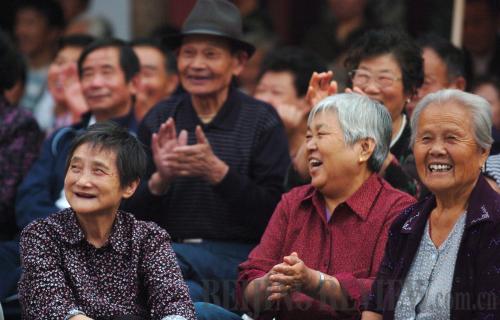|
 |
|
MY DAY: More than 100 retired seniors gathered to participate in performances for or enjoy a show on the Double Ninth Festival, a day of celebration for the elderly in China, in Hefei, capital of Anhui Province, on October 26, 2009 (LIU JUNXI) |
The Ministry of Civil Affairs also predicts that by 2050, when the country's aging population reaches a peak, the old-age market will be worth 800 billion yuan ($120 billion). Currently, the market scale is only 100 billion yuan ($15 billion).
Even the existing retirement homes still can't meet the demand of the people living there. One important reason is the lack of caregivers. That's also a problem facing those elderly in need of home services.
It's estimated that the number of daily caregivers in China should be at least 10 million. In the United Kingdom, there are around 6 million volunteers or part-time caregivers, about 10 percent of its population. If China wants 1 percent of its population to become full-time or part-time caregivers, the number will be at least 10 million. At present, there are about 200,000 caregivers across the country, according to the CNCA.
The price of peace
But can simply setting up retirement homes and training caregivers bring a boom for the old-age market and relieve the pressure of an aging society in China?
What has lured thousands of senior citizens to the Beijing No.1 Social Welfare Institution is its cheap price. According to its website, a twin-bed room facing south costs 960 yuan ($143) per month per person.
The Beijing No.1 Social Welfare Institution is a retirement home set up by the Beijing Municipal Government. It is a non-profit and financed by the government and therefore has a low price, said Wei Xiaobiao, Vice Director of the Social Welfare Department of the Beijing Municipal Bureau of Civil Affairs. Actually, the cost per bed was at least 2,600 yuan ($388) three years ago.
Government-financed retirement homes, being non-profit or running at a cheap price, should give priority to those disabled or those with low incomes, no incomes, or no family. Most of the demands are to be satisfied by privately run ones. However, in sharp contrast to the thousands of applicants to the Beijing No.1 Social Welfare Institution, "most of the private retirement homes are running with high bed vacancy rates," said Du Peng, professor and Director of Institute of Gerontology, Renmin University of China.
Fushou Retirement Home in Jingzhou City, Hubei Province, now has 15 senior residents following its opening last December. The number is low, especially compared to the 2.8 million yuan ($418,000) investment and more than 150 beds still available. The high vacancy rate has to do with the private home's price—they charge 1,000 yuan per person per month.
"The price is a little expensive, especially in a small town like ours," said Hong Yu, Manager of Fushou Retirement Home.
"Most importantly, people here are more conservative than those in big cities like Beijing and Shanghai. And an accepted idea is that finishing one's life in a retirement home is a miserable ending and means their children are unfilial," said Hong.
"I could not imagine my children sending me to a retirement home, no matter how nice it is. I would rather die in my shabby home than a luxurious nursing home. I will be the most pathetic guy in my friends' eyes if I moved into a retirement home," said Yang Jianxin, a 56-year-old resident in Jingzhou of Hubei.
But even in Beijing, many old people are not so open-minded as Hong thinks. The Beijing Municipal Bureau of Statistics conducted a survey among senior residents. The results released in September showed 55 percent of respondents said they didn't want to live in a retirement home at all, and 31.6 percent thought they might choose retirement homes after reaching a certain age. Among those unwilling to live in retirement homes, 18.3 percent said retirement home fees are too high.
Therefore, home services for the elderly will become a mainstream in China, said Yan Qingchun, Deputy Director of CNCA.
Home services for senior citizens will create 500,000 jobs a year, said Yan. But, professional home services will include health care, food, psychological services, etc. Currently, only 10 percent, or about 20,000, are professional caregivers certified by the government. In big cities like Beijing, the proportion is higher, with 2,400 out of 4,000 are certified caregivers. This means the country needs more investments and efforts in training professional caregivers to meet the demand of China's ever-growing aging population. |
